Challenges and Solutions in Hospitality and Tourism Management
VerifiedAdded on 2023/02/01
|5
|1230
|96
Report
AI Summary
This report provides an overview of the multifaceted challenges within the hospitality and tourism industry. It begins by highlighting operational issues such as labor shortages and increased competition, emphasizing the need for innovation. The report then delves into human resource concerns, including training, communication, and employee morale, illustrating their impact on service quality and business reputation. Financial aspects, such as capital shortages and levy issues, are also addressed, along with potential solutions like entrepreneurship and foreign investment. Finally, the report examines product and market contexts, focusing on intense competition, customer control, and the commoditization of hotel products, concluding that the industry faces complex and evolving challenges that require adaptive management strategies.
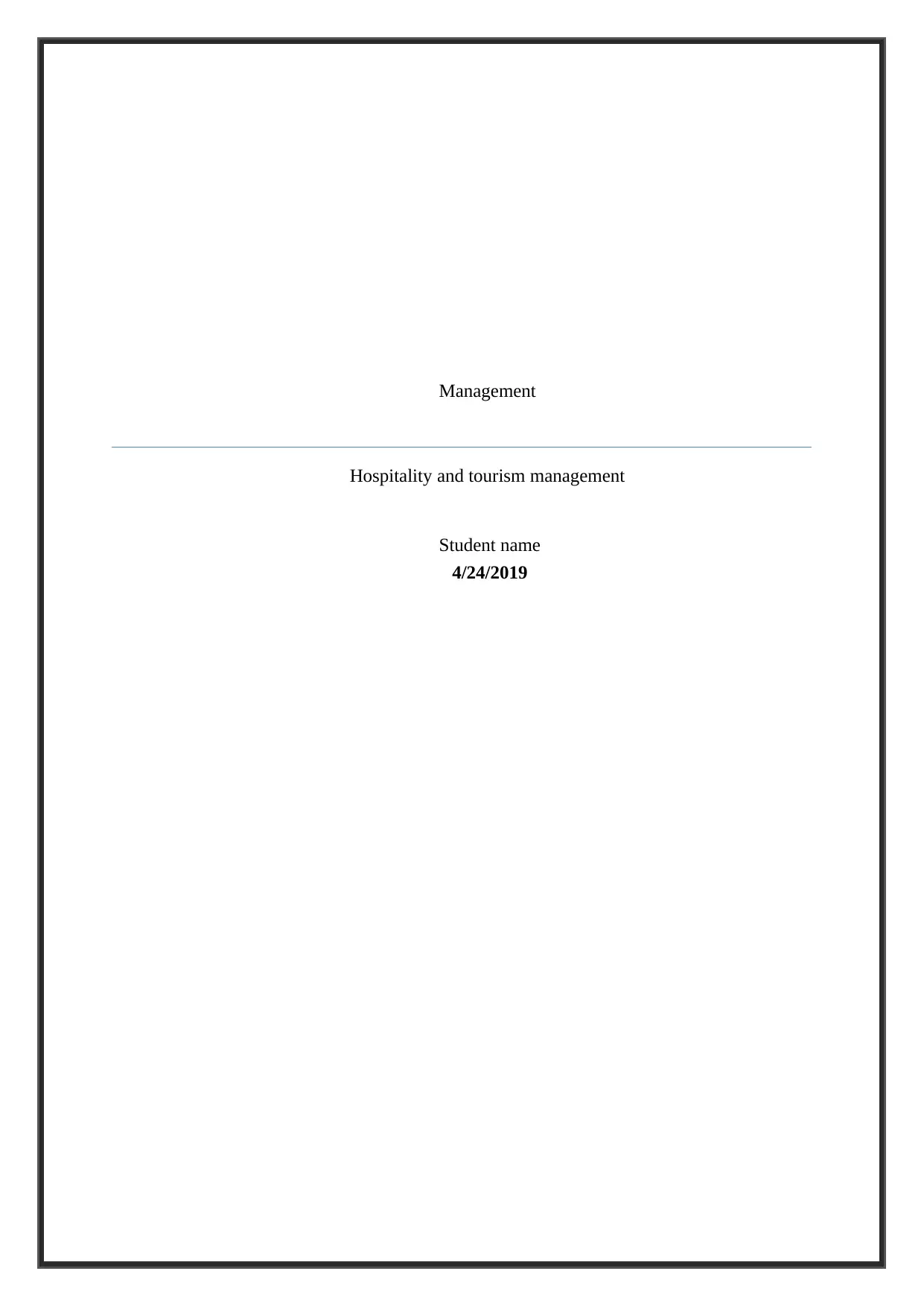
Management
Hospitality and tourism management
Student name
4/24/2019
Hospitality and tourism management
Student name
4/24/2019
Paraphrase This Document
Need a fresh take? Get an instant paraphrase of this document with our AI Paraphraser
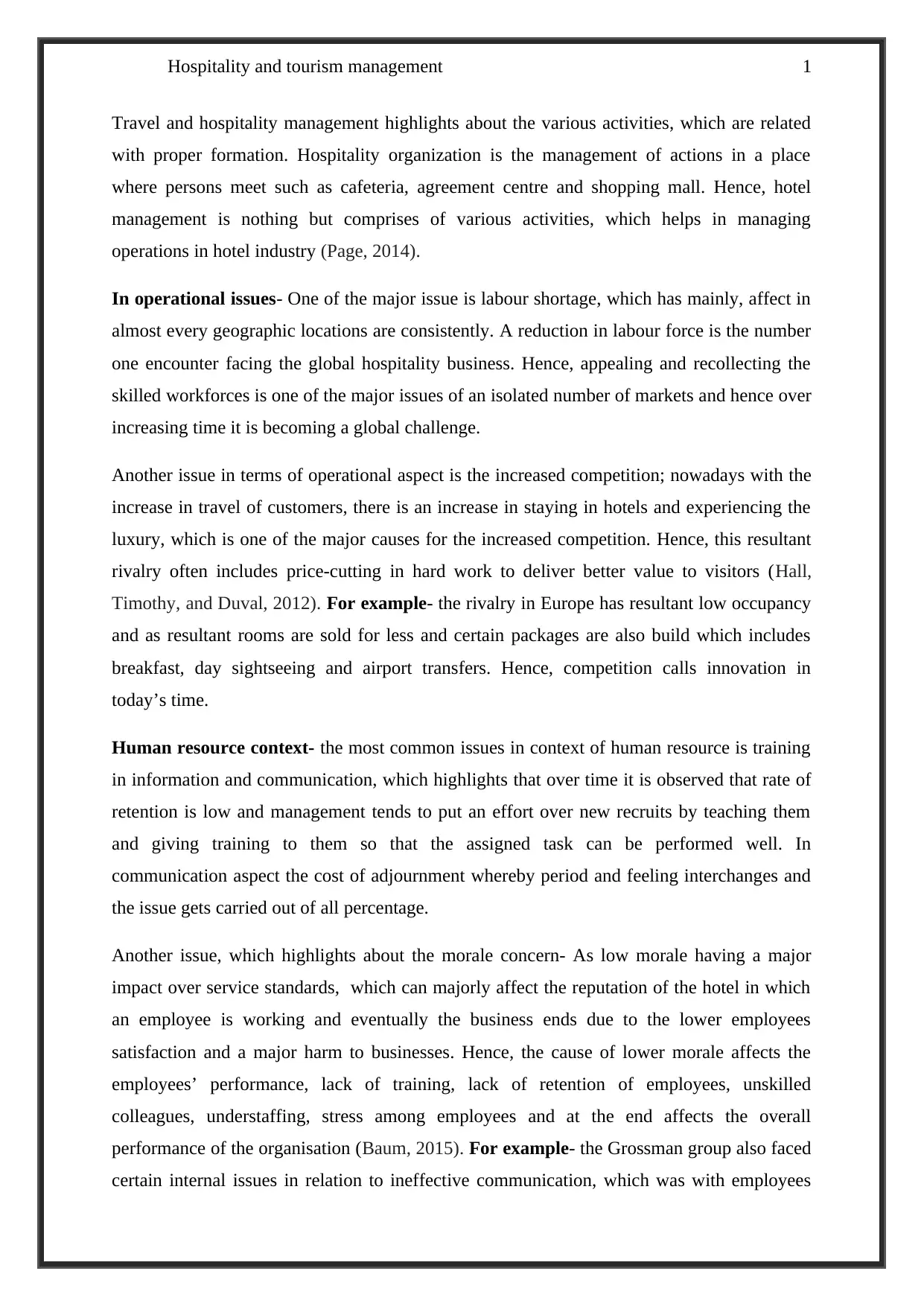
Hospitality and tourism management 1
Travel and hospitality management highlights about the various activities, which are related
with proper formation. Hospitality organization is the management of actions in a place
where persons meet such as cafeteria, agreement centre and shopping mall. Hence, hotel
management is nothing but comprises of various activities, which helps in managing
operations in hotel industry (Page, 2014).
In operational issues- One of the major issue is labour shortage, which has mainly, affect in
almost every geographic locations are consistently. A reduction in labour force is the number
one encounter facing the global hospitality business. Hence, appealing and recollecting the
skilled workforces is one of the major issues of an isolated number of markets and hence over
increasing time it is becoming a global challenge.
Another issue in terms of operational aspect is the increased competition; nowadays with the
increase in travel of customers, there is an increase in staying in hotels and experiencing the
luxury, which is one of the major causes for the increased competition. Hence, this resultant
rivalry often includes price-cutting in hard work to deliver better value to visitors (Hall,
Timothy, and Duval, 2012). For example- the rivalry in Europe has resultant low occupancy
and as resultant rooms are sold for less and certain packages are also build which includes
breakfast, day sightseeing and airport transfers. Hence, competition calls innovation in
today’s time.
Human resource context- the most common issues in context of human resource is training
in information and communication, which highlights that over time it is observed that rate of
retention is low and management tends to put an effort over new recruits by teaching them
and giving training to them so that the assigned task can be performed well. In
communication aspect the cost of adjournment whereby period and feeling interchanges and
the issue gets carried out of all percentage.
Another issue, which highlights about the morale concern- As low morale having a major
impact over service standards, which can majorly affect the reputation of the hotel in which
an employee is working and eventually the business ends due to the lower employees
satisfaction and a major harm to businesses. Hence, the cause of lower morale affects the
employees’ performance, lack of training, lack of retention of employees, unskilled
colleagues, understaffing, stress among employees and at the end affects the overall
performance of the organisation (Baum, 2015). For example- the Grossman group also faced
certain internal issues in relation to ineffective communication, which was with employees
Travel and hospitality management highlights about the various activities, which are related
with proper formation. Hospitality organization is the management of actions in a place
where persons meet such as cafeteria, agreement centre and shopping mall. Hence, hotel
management is nothing but comprises of various activities, which helps in managing
operations in hotel industry (Page, 2014).
In operational issues- One of the major issue is labour shortage, which has mainly, affect in
almost every geographic locations are consistently. A reduction in labour force is the number
one encounter facing the global hospitality business. Hence, appealing and recollecting the
skilled workforces is one of the major issues of an isolated number of markets and hence over
increasing time it is becoming a global challenge.
Another issue in terms of operational aspect is the increased competition; nowadays with the
increase in travel of customers, there is an increase in staying in hotels and experiencing the
luxury, which is one of the major causes for the increased competition. Hence, this resultant
rivalry often includes price-cutting in hard work to deliver better value to visitors (Hall,
Timothy, and Duval, 2012). For example- the rivalry in Europe has resultant low occupancy
and as resultant rooms are sold for less and certain packages are also build which includes
breakfast, day sightseeing and airport transfers. Hence, competition calls innovation in
today’s time.
Human resource context- the most common issues in context of human resource is training
in information and communication, which highlights that over time it is observed that rate of
retention is low and management tends to put an effort over new recruits by teaching them
and giving training to them so that the assigned task can be performed well. In
communication aspect the cost of adjournment whereby period and feeling interchanges and
the issue gets carried out of all percentage.
Another issue, which highlights about the morale concern- As low morale having a major
impact over service standards, which can majorly affect the reputation of the hotel in which
an employee is working and eventually the business ends due to the lower employees
satisfaction and a major harm to businesses. Hence, the cause of lower morale affects the
employees’ performance, lack of training, lack of retention of employees, unskilled
colleagues, understaffing, stress among employees and at the end affects the overall
performance of the organisation (Baum, 2015). For example- the Grossman group also faced
certain internal issues in relation to ineffective communication, which was with employees
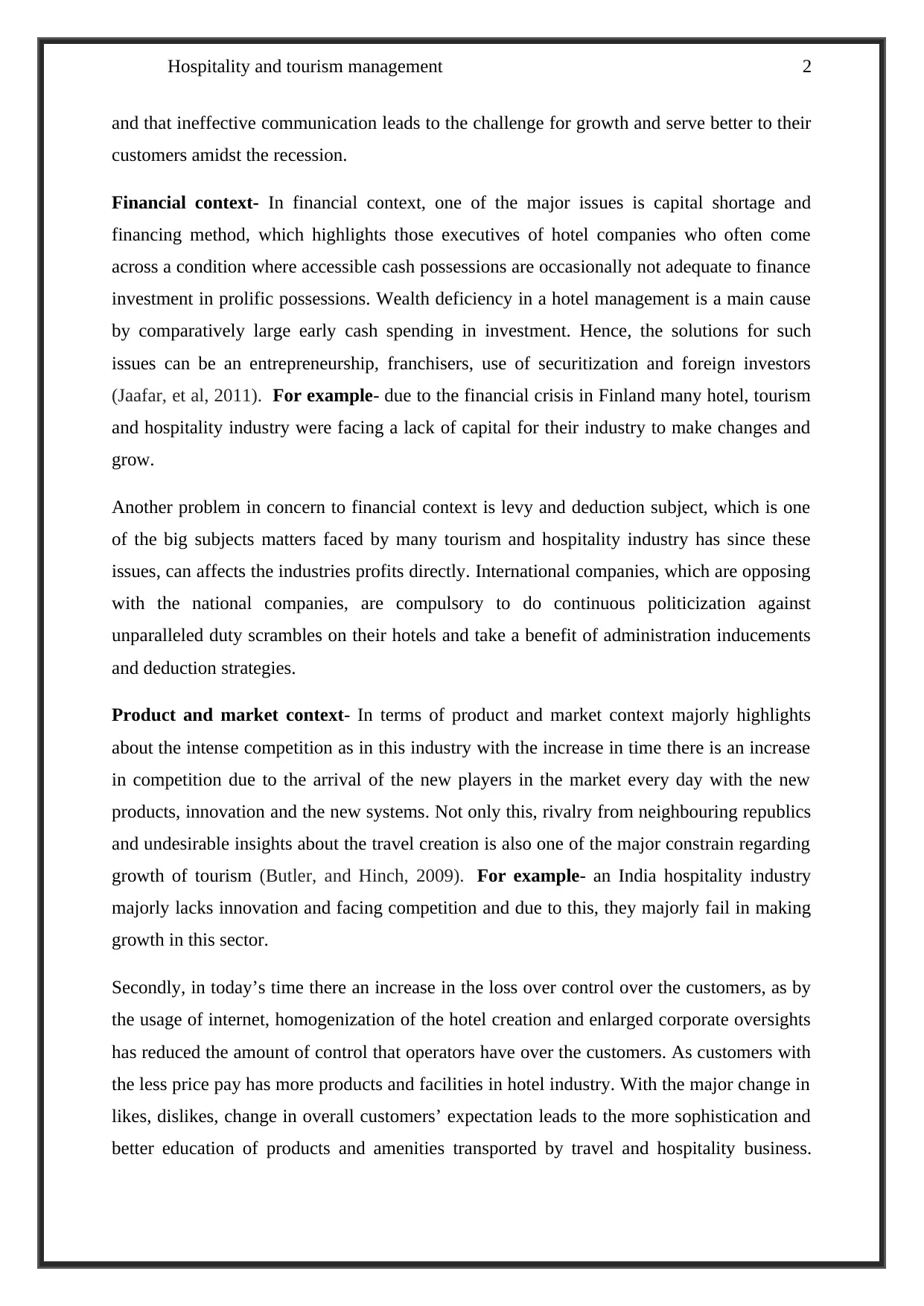
Hospitality and tourism management 2
and that ineffective communication leads to the challenge for growth and serve better to their
customers amidst the recession.
Financial context- In financial context, one of the major issues is capital shortage and
financing method, which highlights those executives of hotel companies who often come
across a condition where accessible cash possessions are occasionally not adequate to finance
investment in prolific possessions. Wealth deficiency in a hotel management is a main cause
by comparatively large early cash spending in investment. Hence, the solutions for such
issues can be an entrepreneurship, franchisers, use of securitization and foreign investors
(Jaafar, et al, 2011). For example- due to the financial crisis in Finland many hotel, tourism
and hospitality industry were facing a lack of capital for their industry to make changes and
grow.
Another problem in concern to financial context is levy and deduction subject, which is one
of the big subjects matters faced by many tourism and hospitality industry has since these
issues, can affects the industries profits directly. International companies, which are opposing
with the national companies, are compulsory to do continuous politicization against
unparalleled duty scrambles on their hotels and take a benefit of administration inducements
and deduction strategies.
Product and market context- In terms of product and market context majorly highlights
about the intense competition as in this industry with the increase in time there is an increase
in competition due to the arrival of the new players in the market every day with the new
products, innovation and the new systems. Not only this, rivalry from neighbouring republics
and undesirable insights about the travel creation is also one of the major constrain regarding
growth of tourism (Butler, and Hinch, 2009). For example- an India hospitality industry
majorly lacks innovation and facing competition and due to this, they majorly fail in making
growth in this sector.
Secondly, in today’s time there an increase in the loss over control over the customers, as by
the usage of internet, homogenization of the hotel creation and enlarged corporate oversights
has reduced the amount of control that operators have over the customers. As customers with
the less price pay has more products and facilities in hotel industry. With the major change in
likes, dislikes, change in overall customers’ expectation leads to the more sophistication and
better education of products and amenities transported by travel and hospitality business.
and that ineffective communication leads to the challenge for growth and serve better to their
customers amidst the recession.
Financial context- In financial context, one of the major issues is capital shortage and
financing method, which highlights those executives of hotel companies who often come
across a condition where accessible cash possessions are occasionally not adequate to finance
investment in prolific possessions. Wealth deficiency in a hotel management is a main cause
by comparatively large early cash spending in investment. Hence, the solutions for such
issues can be an entrepreneurship, franchisers, use of securitization and foreign investors
(Jaafar, et al, 2011). For example- due to the financial crisis in Finland many hotel, tourism
and hospitality industry were facing a lack of capital for their industry to make changes and
grow.
Another problem in concern to financial context is levy and deduction subject, which is one
of the big subjects matters faced by many tourism and hospitality industry has since these
issues, can affects the industries profits directly. International companies, which are opposing
with the national companies, are compulsory to do continuous politicization against
unparalleled duty scrambles on their hotels and take a benefit of administration inducements
and deduction strategies.
Product and market context- In terms of product and market context majorly highlights
about the intense competition as in this industry with the increase in time there is an increase
in competition due to the arrival of the new players in the market every day with the new
products, innovation and the new systems. Not only this, rivalry from neighbouring republics
and undesirable insights about the travel creation is also one of the major constrain regarding
growth of tourism (Butler, and Hinch, 2009). For example- an India hospitality industry
majorly lacks innovation and facing competition and due to this, they majorly fail in making
growth in this sector.
Secondly, in today’s time there an increase in the loss over control over the customers, as by
the usage of internet, homogenization of the hotel creation and enlarged corporate oversights
has reduced the amount of control that operators have over the customers. As customers with
the less price pay has more products and facilities in hotel industry. With the major change in
likes, dislikes, change in overall customers’ expectation leads to the more sophistication and
better education of products and amenities transported by travel and hospitality business.
⊘ This is a preview!⊘
Do you want full access?
Subscribe today to unlock all pages.

Trusted by 1+ million students worldwide
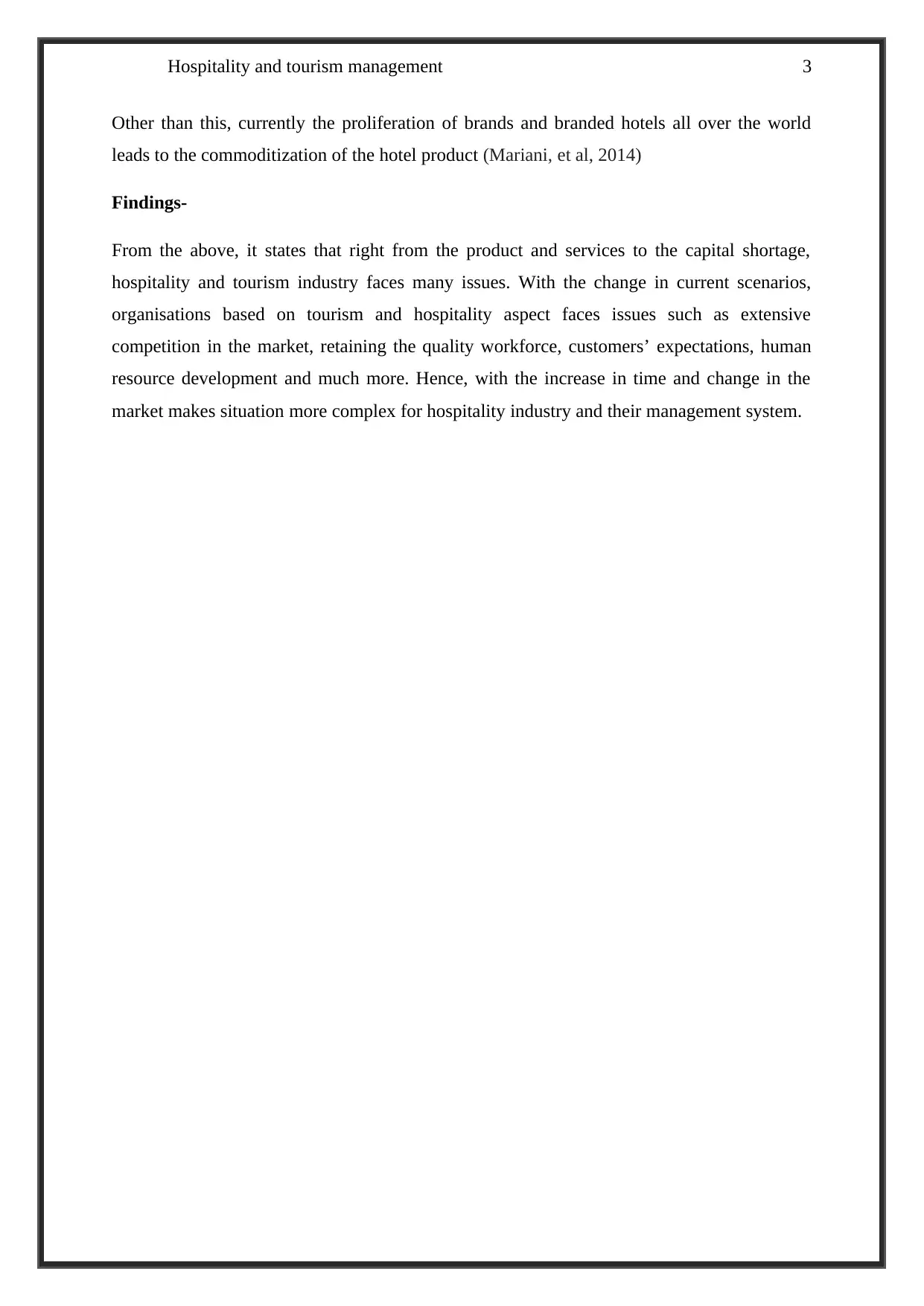
Hospitality and tourism management 3
Other than this, currently the proliferation of brands and branded hotels all over the world
leads to the commoditization of the hotel product (Mariani, et al, 2014)
Findings-
From the above, it states that right from the product and services to the capital shortage,
hospitality and tourism industry faces many issues. With the change in current scenarios,
organisations based on tourism and hospitality aspect faces issues such as extensive
competition in the market, retaining the quality workforce, customers’ expectations, human
resource development and much more. Hence, with the increase in time and change in the
market makes situation more complex for hospitality industry and their management system.
Other than this, currently the proliferation of brands and branded hotels all over the world
leads to the commoditization of the hotel product (Mariani, et al, 2014)
Findings-
From the above, it states that right from the product and services to the capital shortage,
hospitality and tourism industry faces many issues. With the change in current scenarios,
organisations based on tourism and hospitality aspect faces issues such as extensive
competition in the market, retaining the quality workforce, customers’ expectations, human
resource development and much more. Hence, with the increase in time and change in the
market makes situation more complex for hospitality industry and their management system.
Paraphrase This Document
Need a fresh take? Get an instant paraphrase of this document with our AI Paraphraser
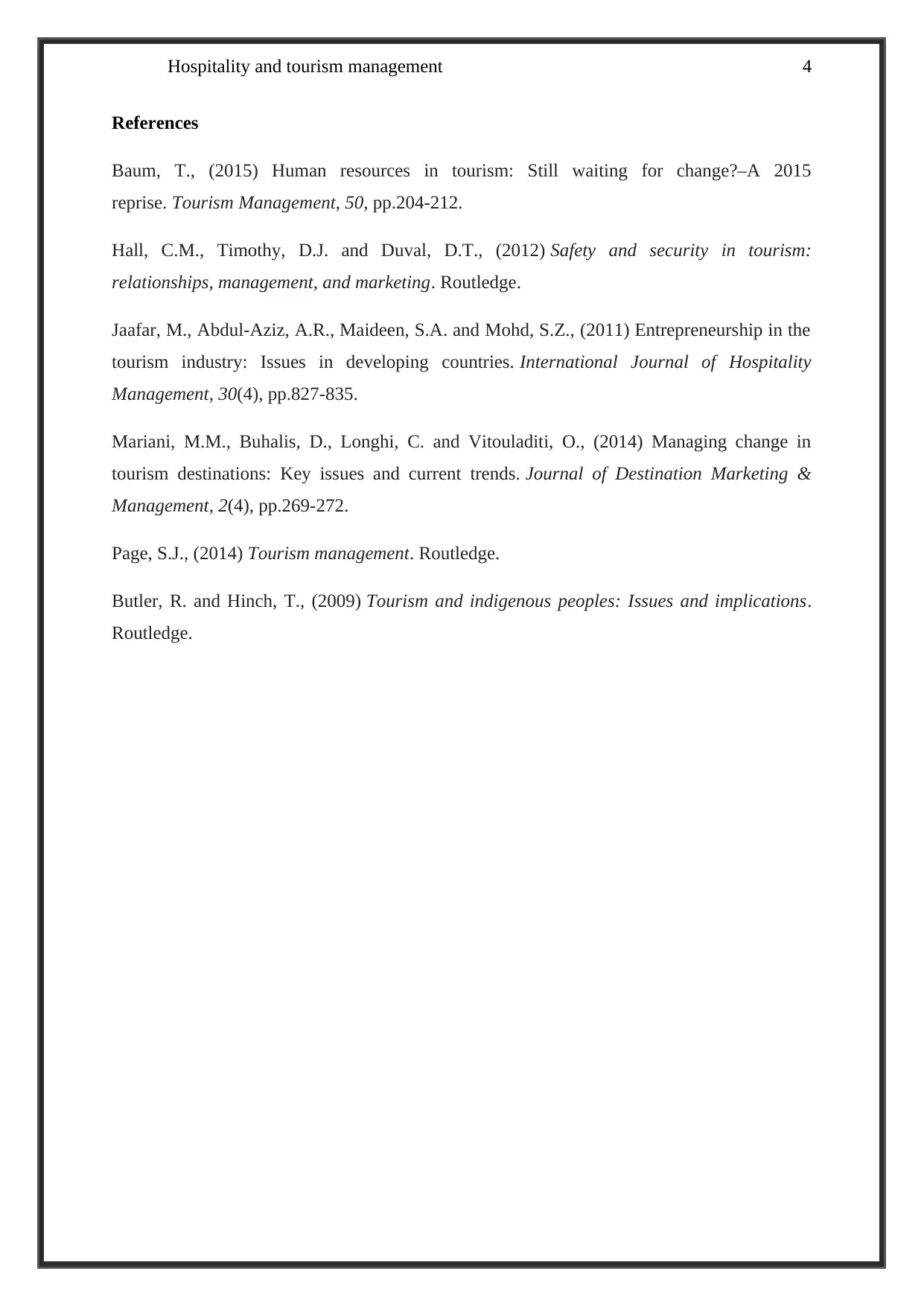
Hospitality and tourism management 4
References
Baum, T., (2015) Human resources in tourism: Still waiting for change?–A 2015
reprise. Tourism Management, 50, pp.204-212.
Hall, C.M., Timothy, D.J. and Duval, D.T., (2012) Safety and security in tourism:
relationships, management, and marketing. Routledge.
Jaafar, M., Abdul-Aziz, A.R., Maideen, S.A. and Mohd, S.Z., (2011) Entrepreneurship in the
tourism industry: Issues in developing countries. International Journal of Hospitality
Management, 30(4), pp.827-835.
Mariani, M.M., Buhalis, D., Longhi, C. and Vitouladiti, O., (2014) Managing change in
tourism destinations: Key issues and current trends. Journal of Destination Marketing &
Management, 2(4), pp.269-272.
Page, S.J., (2014) Tourism management. Routledge.
Butler, R. and Hinch, T., (2009) Tourism and indigenous peoples: Issues and implications.
Routledge.
References
Baum, T., (2015) Human resources in tourism: Still waiting for change?–A 2015
reprise. Tourism Management, 50, pp.204-212.
Hall, C.M., Timothy, D.J. and Duval, D.T., (2012) Safety and security in tourism:
relationships, management, and marketing. Routledge.
Jaafar, M., Abdul-Aziz, A.R., Maideen, S.A. and Mohd, S.Z., (2011) Entrepreneurship in the
tourism industry: Issues in developing countries. International Journal of Hospitality
Management, 30(4), pp.827-835.
Mariani, M.M., Buhalis, D., Longhi, C. and Vitouladiti, O., (2014) Managing change in
tourism destinations: Key issues and current trends. Journal of Destination Marketing &
Management, 2(4), pp.269-272.
Page, S.J., (2014) Tourism management. Routledge.
Butler, R. and Hinch, T., (2009) Tourism and indigenous peoples: Issues and implications.
Routledge.
1 out of 5
Related Documents
Your All-in-One AI-Powered Toolkit for Academic Success.
+13062052269
info@desklib.com
Available 24*7 on WhatsApp / Email
![[object Object]](/_next/static/media/star-bottom.7253800d.svg)
Unlock your academic potential
Copyright © 2020–2026 A2Z Services. All Rights Reserved. Developed and managed by ZUCOL.





